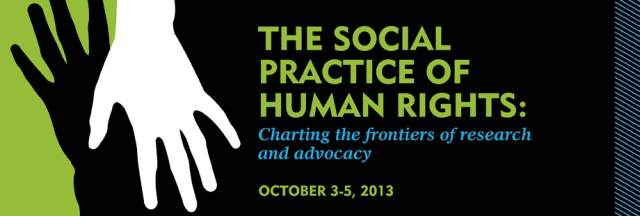Collaborative Advocacy: What Effects does the Visual Documentation have on Social Relations? The Case study of Human Rights Organization B'Tselem in Israel-Palestine
Location
River Campus - Room M2006
Start Date
10-4-2013 3:15 PM
Abstract
The paper focuses on recent developments in human rights advocacy, while it draws on visual documentation of the Israeli human rights organization B'Tselem. In 2007 the organization launched a visual documentation project whereby using video-cameras, Palestinians document abuses of their own rights and of those they witness. The video records are presented as an answer to allegations that the HR organization is biased, by demonstrating indisputable evidence that rights were indeed violated. In the paper, I seek to go beyond the essential dynamics of accusations and counter-accusations and focus on the unstudied aspect of social relations in the collaboration between professionals and amateurs in the new visual "technology of witnessing". The collaboration takes place between the human rights members and victims and/or between Israeli employees and Palestinian volunteers. I ponder on what can be learned on the role of each party in the collaborative process of production "truth claims"? It has been demonstrated that the activism and the processes of professionalization in NGOs are also connect and are in tension (Bondi and Laurie 2005: 395). What can be understood about the mentioned larger trend of the neoliberal society in regard to the human rights video advocacy? What are the effects of disciplinary and liberal modalities of power on this kind of collaboration (Brown 1995: 59)? B'Tselem's work can be seen as a case where through the technological tools and professional human rights discourse, the organization gives voice to Palestinians thus merging the resistance of individuals and groups. Hence, is there a construction of "truth claim" in the collaboration of Israeli human rights employees and Palestinian witnesses/victims? And how the new visual "technology of witnessing" demonstrates and exploits the knowledge, expertise and experience of the professionals and inexperienced amateurs?
Collaborative Advocacy: What Effects does the Visual Documentation have on Social Relations? The Case study of Human Rights Organization B'Tselem in Israel-Palestine
River Campus - Room M2006
The paper focuses on recent developments in human rights advocacy, while it draws on visual documentation of the Israeli human rights organization B'Tselem. In 2007 the organization launched a visual documentation project whereby using video-cameras, Palestinians document abuses of their own rights and of those they witness. The video records are presented as an answer to allegations that the HR organization is biased, by demonstrating indisputable evidence that rights were indeed violated. In the paper, I seek to go beyond the essential dynamics of accusations and counter-accusations and focus on the unstudied aspect of social relations in the collaboration between professionals and amateurs in the new visual "technology of witnessing". The collaboration takes place between the human rights members and victims and/or between Israeli employees and Palestinian volunteers. I ponder on what can be learned on the role of each party in the collaborative process of production "truth claims"? It has been demonstrated that the activism and the processes of professionalization in NGOs are also connect and are in tension (Bondi and Laurie 2005: 395). What can be understood about the mentioned larger trend of the neoliberal society in regard to the human rights video advocacy? What are the effects of disciplinary and liberal modalities of power on this kind of collaboration (Brown 1995: 59)? B'Tselem's work can be seen as a case where through the technological tools and professional human rights discourse, the organization gives voice to Palestinians thus merging the resistance of individuals and groups. Hence, is there a construction of "truth claim" in the collaboration of Israeli human rights employees and Palestinian witnesses/victims? And how the new visual "technology of witnessing" demonstrates and exploits the knowledge, expertise and experience of the professionals and inexperienced amateurs?




Comments
This biennial conference provides a unique space for scholars, practitioners and advocates to engage in collaboration, dialogue and critical analysis of human rights advocacy — locally and globally. Learn more about the Human Rights Center at the University of Dayton >>>.